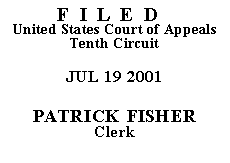

| KEITH PARKER,
v.
MR. JAMES, (Park County
Administrator); JOHN W. SUTHER,
Executive Dir. D.O.C.; MR. REED;
MR. DAVIS |
No. 00-1285
(D.C. No. 00-Z-713) (D. Colo.) |
The district court granted Parker leave to proceed in forma pauperis and dismissed his case under 28 U.S.C. § 1915(e)(2)(B). (Doc. 10, at 1-2.) The court found that: (1) Parker's disciplinary record and security classification could be expunged only through a writ of habeas corpus and that Parker had not exhausted his state remedies as required to bring a federal habeas proceeding (id. at 3, 5); (2) the damages claims arising out of the disciplinary proceeding were barred by Edwards v. Balisok, 520 U.S. 641 (1997) (id. at 4); and (3) Parker's Eighth Amendment claim was frivolous because he did not allege that the named defendants themselves deprived him of access to legal materials or exercise (id. at 4-5). The court also found that Parker's appeal to this court was not taken in good faith and therefore that he could not proceed in forma pauperis on appeal. (Doc. 15.)
For substantially the reasons stated by the district court, we AFFIRM. Parker may not bring a claim under § 1983 that would necessarily imply the invalidity of his good-time credits unless he first shows that the disciplinary conviction has previously been invalidated. See Edwards, 520 U.S. at 643, 646. In addition, the district court did not abuse its discretion in dismissing his Eighth Amendment claim as legally frivolous. To state a conditions-of-confinement claim under the Eighth Amendment, Parker must allege that Defendants knew of and disregarded an excessive risk to Parker's health or safety. See Farmer v. Brennan, 511 U.S. 825, 837 (1994). Parker's allegations do not even remotely approach this standard.
Parker is reminded of his continuing obligation to make partial payments until the full amount of his filing fee is paid.
ENTERED FOR THE COURT
David M. Ebel
Circuit Judge
*.After examining appellant's brief and the appellate record, this panel has determined unanimously that oral argument would not materially assist the determination of this appeal. See Fed. R. App. P. 34(a)(2) and 10th Cir. R. 34.1(G). The case is therefore ordered submitted without oral argument. This Order and Judgment is not binding precedent, except under the doctrines of law of the case, res judicata, and collateral estoppel. The court generally disfavors the citation of orders and judgments; nevertheless, an order and judgment may be cited under the terms and conditions of 10th Cir. R. 36.3.